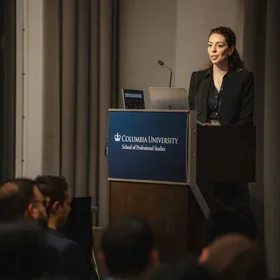By Steven Cohen, Ph.D., Director of the M.S. in Sustainability Management program, School of Professional Studies
A recent piece by Coral Davenport in the New York Times highlighted the Trump Administration’s rapid and destructive attack on the system of American environmental, health, safety, food, drug, and economic regulation. The Administration’s right-wing ideology holds that our regulatory system is out of control. That incremental, surgical improvements are insufficient, and the only way to reform the system is to destroy it. In other words, “in order to save the town, we had to destroy it.” According to Davenport:
“Across the more than 400 federal agencies that regulate almost every aspect of American life, from flying in airplanes to processing poultry, Mr. Trump’s appointees are working with the Department of Government Efficiency, the cost-cutting initiative headed by Elon Musk and also called DOGE, to launch a sweeping new phase in their quest to dismantle much of the federal government: deregulation on a mass scale. Usually, the legal process of repealing federal regulations takes years — and rules erased by one administration can be restored by another. But after chafing at that system during his first term and watching President Joseph R. Biden Jr. enact scores of new rules pushed by the left, Mr. Trump has marshaled a strategy for a dramatic do-over designed to kill regulations swiftly and permanently… A sign of Mr. Trump’s aggressiveness came last week, when the White House directed agencies to bypass a lengthy legal requirement that proposed changes to rules be posted for public comment. Instead, the memo said, regulators should in many cases just move to immediately cancel the rules.”
The Trump team believes the key lesson from Trump 1.0 was that they moved too slowly and paid too much attention to normal legal procedures. That the standard approaches to policy change provided endless opportunities for delay and that it was better to take a sledgehammer to existing programs, rules, and organizations and then, later on, rebuild whatever proves to be truly essential. The problem with that approach is that destruction is easier than construction. In the case of regulations, once they are dismantled and anarchy replaces the rule of law, the likely result is a cascade of crises. Remove public health and food and drug safety rules, and many people will get sick and die who would otherwise live healthy and productive lives. Instead of preventing problems, we end up in an endless cycle of emergency response. We already live in a world where chemicals are introduced into production processes without determining their impact on human and ecosystem health. If you remove governmental and university scientific research capacity, when people get sick and die, we won’t know its cause or a possible cure. Imagine if COVID-19 had not been rapidly studied and then understood by scientists. President Trump would not have been able to mobilize the research capacity that successfully developed vaccines at “warp speed.” America’s world-leading medical research capacity would no longer exist. How many millions of people would have died?
I am not arguing against regulatory reform. I agree that our rules are often used by interest groups to simply stop the construction of everything from homes to electric power lines. There is a strong argument for speeding up reviews and eliminating endless appeals. But there is a difference between regulatory reform that fast-tracks reviews and regulatory destruction.
American businesses know that the world is complicated, interconnected, and dangerous. They will find it difficult to operate and invest in a nation with erratic rules and eviscerated scientific capacity. COVID was not good for business, and if the forces favoring discarding standard public health practices had triumphed and there had been no effort to isolate people for any time at all back in 2020, the virus would have killed many more people before “herd immunity” was finally achieved. The flu of 1918 spread in an era of little science and regulation. Imagine an even more potent virus accelerated by modern travel and freight technology. Imagine the toxic releases of Cancer Alley spread to hundreds of other unregulated factories.
It’s like driving without traffic lights on roads without speed limits. As we see the initial impact of the Administration’s utterly unhinged tariff policies, consistency and explicit strategies are critical. Business requires certainty and stability. If rules are to be changed, they need to be carefully revised with ample time to assess positive and negative impacts. Businesses are often resistant to regulation, but if they are to be regulated, they hope for stability in the regulatory environment. It is difficult to determine the risk of investing capital if the regulatory environment changes dramatically whenever a new president comes into office.
In addition to the regulatory changes, we also see rapid reversals in tariffs. Trump’s obsession with manufacturing fails to understand the transition of America’s economy to a service economy. Media, design, education, health care, software development, business analytics, marketing, hospitality, and a host of other services form the high value-added and high-profit foundation of America’s economy. The President knows this. His family runs hotels, not steel mills. While a certain amount of manufacturing is needed for national security purposes, our main objective should be to diversify our supply chains globally to protect our producers and consumers from politically-based or extreme weather-induced interruptions to those supply chains. In an excellent and fact-based discussion of America’s transition from a manufacturing economy to our brain-based service economy, the Wall Street Journal’s Justin Lahart reported that:
“The U.S. now exports in excess of $1 trillion-worth of services—far more than any other country. Moreover, America’s services exports are undercounted as a result of companies moving overseas the rights to intellectual property developed in the U.S.—like patents and trademarks—for tax purposes. (Ireland, a prime destination for those rights, is counted as the world’s fourth-largest services exporter.)… in 1980 manufacturing accounted for 39% of the U.S. jobs where workers earned high wages (after adjusting for factors such as education). By 2021 that had dropped to 20%. Over the same period, the share of high-paying jobs in the finance, professional and legal industries jumped from 8% to 26%.”
Our current economy has left many people behind, but that is more an issue of income distribution and public policy than the impact of global supply chains. In a more automated world, we need less manual labor and a more educated workforce. People who lose their jobs need rapid access to training for new jobs. America is the wealthiest nation in the world. A global economy provides the best goods and services at the lowest prices by taking advantage of differences in culture, labor, talent, and geography. Our advantages in the service sector include our edge in scientific research, entertainment, and the arts. Freedom stimulates courage and creativity; repression stimulates fear and silence. The attack on university and government-based science, immigration, and the rule of law reduces America’s advantages in the global economy. Instability in the global economy due to Trump’s trade wars and his poor treatment of our traditional allies results in damage to America’s dominant role in that global economy.
All of this undermines America’s economic power, which, when coupled with our military power, is the foundation of America’s political stability. That stability enables us to attract the foreign capital investment that helps keep our economy growing and prevents its collapse. Attacking regulation, the rule of law, our allies, and the global economy undermines our economic and political stability and puts this nation at economic and political risk. All this chaos is in the service of a dysfunctional ideology built on 19th-century mercantilism, imperialism, xenophobia, and a range of beliefs that tend to undermine America’s central role in our political and economic world. America first is turning into America alone.
Deregulation, tariffs, reduced adherence to court decisions along with attacks on the legal profession, performative arrests of international students and immigrants, attacks on elite universities, as well as a relentless diet of propaganda and lies all combine to undermine the United States’ preeminent role in international relations and the global economy. The foundation of our prosperity and power is being undermined by a misguided and possibly suicidal attack on the commercial environment in which our businesses operate. State and local governments, private institutions, the business community, community-based groups, and average citizens will all need to mobilize to push back on this range of dysfunctional and destabilizing policies. I suspect that when the economic impact of these policies becomes real, political polls will reflect decreased support for those in power. If it happens quickly, I would not be surprised to see the President declare victory, clean house by replacing top officials, and reverse course. However, if he decides his only goal is to concentrate power in the presidency, polls and economic collapse may not have the impact I expect.
Views and opinions expressed here are those of the authors, and do not necessarily reflect the official position of Columbia School of Professional Studies or Columbia University.
About the Program
The Columbia University M.S. in Sustainability Management program offered by the School of Professional Studies in partnership with the Climate School provides students cutting-edge policy and management tools they can use to help public and private organizations and governments address environmental impacts and risks, pollution control, and remediation to achieve sustainability. The program is customized for working professionals and is offered as both a full- and part-time course of study.



